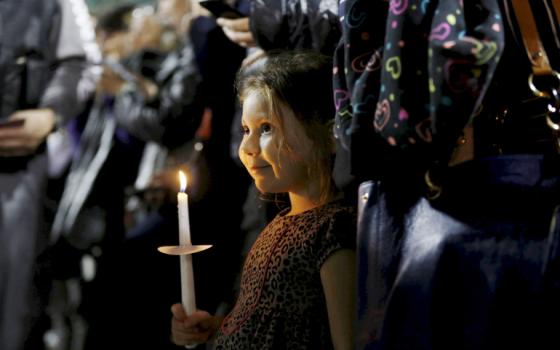This blog generally is about the church's response to crises around the world. But there are some days when I just don't know how to respond anymore.
Yes, I could tell you that San Bernardino, California, Bishop Gerald Barnes has called for prayers for unity and healing after a mass shooting there left 14 people dead, but mostly, I want to turn off the Internet and the television and hug my children.
More and more, it seems, our society becomes increasingly divided, and events that are so horrible they should bring us together instead somehow push us farther apart. My Facebook newsfeed becomes a battleground of people arguing about it.
Instead of our hearts breaking, they seem to get harder and harder.
And as much as I just want to hold my kids and tell them that everything’s going to be all right, I also know that they’re old enough now to hear about and understand — as much as anyone can — these things.
My daughter, who's 11, likes to scan the front page of the morning newspaper. My 9-year-old son brags that he gets all his news from The Washington Post.
But how do you tell them that two people walked into an employee holiday party and began shooting? How do you explain Sandy Hook? Or any of the others?
And more importantly, how do I help create a world where tragedy brings people together, so that they build bridges instead of walls?
Several times, I've written in this space about my favorite quote from Fred Rogers, who said that when he was a child and something awful happened in the world, his mother would tell him to "look for the helpers," that you could always take hope from those who ran toward tragedy to help in any way they could, that it would always show that good ultimately triumphs over whatever evil is in the world.
I still believe that. I’ve based this blog around that, and I tell my children that often.
But I’ve also found that I get some comfort from the past, as well.
Shortly after the terror attacks of Sept. 11, 2001, my wife and I watched the HBO series "Band of Brothers," about a company of paratroopers fighting across Europe in World War II. In those weeks of fear and sadness, I found great comfort in the fact that it was millions of everyday Americans who had saved the world from the Nazi horrors. Ordinary people did extraordinary things and triumphed over great evil.
When I see racism, I am comforted that thousands and thousands of everyday Americans stood up, marched, sat down, protested, voted and won the battle for civil rights in the 1950s and '60s. Ordinary people swept away generations of legalized evil.
I was comforted in 2012 after the incomprehensible shootings at Sandy Hook Elementary School when I saw the movie "The Hobbit: An Unexpected Journey." In it, the wizard Gandalf explains that while some believe only great power can hold evil in check, "that is not what I have found. I've found it is the small things, everyday deeds of ordinary folk that keeps the darkness at bay. Simple acts of kindness and love."
And I’m comforted today by the words of Robert F. Kennedy, who was about to give a campaign speech in Indianapolis when word came that the Rev. Martin Luther King Jr. had been assassinated. There was already rioting in other cities, and his speech was to be held in a black neighborhood that could easily explode in anger. The crowd hadn’t heard the news yet, and rather than duck the issue, Kennedy addressed it head-on.
His words, quoting the fifth-century B.C. poet Aeschylus, brought comfort to that crowd:
My favorite poet was Aeschylus. He once wrote, 'And even in our sleep, pain which cannot forget falls drop by drop upon the heart, until in our own despair, against our will, comes wisdom through the awful grace of God.'
Though I'm still waiting for that wisdom, I think we can all identify with pain that does not forget, even in our sleep. But Kennedy, it seems, had already found some bit of wisdom, likely from the pain he had experienced himself. And that wisdom seems just as pertinent today:
What we need in the United States is not division. What we need in the United States is not hatred. What we need in the United States is not violence and lawlessness, but love and wisdom and compassion toward one another.
He was talking, of course, about racial justice, but those words apply just as well to the debate over guns, refugees or income disparity.
What we need is not division over these things. We already have enough hatred. We need these issues to unite us in common purpose instead of dividing us further.
And as for me? I need to go hug my kids.
Remember: Links, tips and accounts of the response to any crisis anywhere in the world are always welcome at dstockman@ncronline.org.
[Dan Stockman is national correspondent for Global Sisters Report. Follow him on Twitter @DanStockman or on Facebook.]

